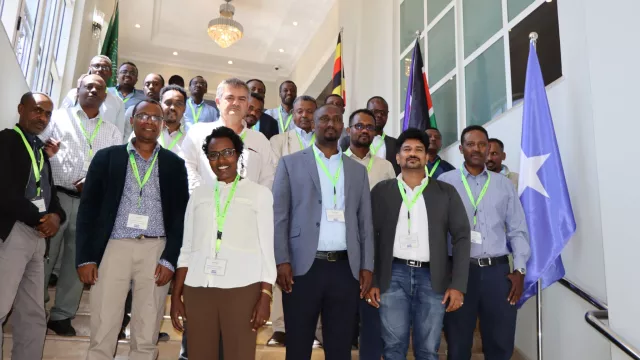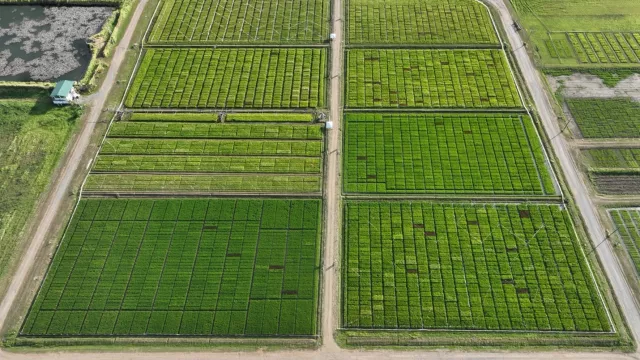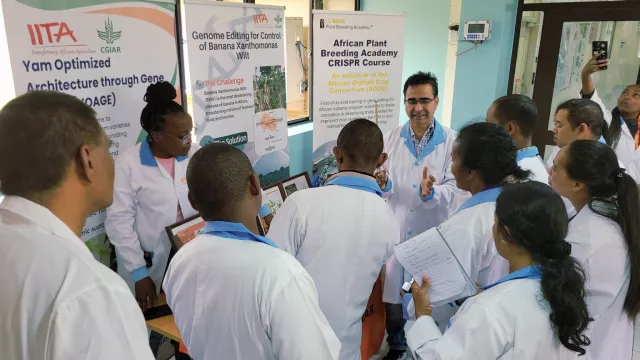Breeding for Tomorrow

Overview
We aim to develop and deliver a portfolio of climate-resilient, market-preferred, and nutritious crops, livestock, and aquatic species that make food systems more productive, resilient, inclusive, and sustainable.
By leveraging breeding modernization, market intelligence, and strengthened partnerships, we will improve seed systems, boost agricultural productivity and resilience, reduce hunger, and enhance sustainability, particularly in the Global South.
Our goal
Our work aims to help
Where we work
Where we will work in Central and West Asia and North Africa, Latin America and the Caribbean, South and Southeast Asia, Sub-Saharan Africa
Challenges
Challenges we’ll address
- Optimizing crops for mechanization, longer shelf-lives, simpler processing, and climate resilience to provide for the Global South’s growing populations
- Lowering agricultural costs without sacrificing nutrition
- Improve environmental sustainability
Areas of work
Market Intelligence
We will optimize the return on investment by driving institutional innovation in product design and investment prioritization, which will support the development and delivery of climate-resilient, nutritious, and market-preferred products.

Accelerated Breeding
We will accelerate the development of a new generation of climate-resilient, nutritious, and market-preferred varieties. We will also steer efficient, sustainable, and fair breeding processes and collaborations.

Breeding Resources
We will work to empower interconnected breeding programs by providing a portfolio of services, that enables breeders to access global technologies, knowledge, and innovations for maximum impact.
As part of this effort we have launched Crops to End Hunger, a global initiative for modernizing crop breeding programs and deploying tools to improve breeding efficiency.

Inclusive Delivery
We will accelerate the delivery of genetic gain to farmers’ fields in the Global South through robust, equitable and scalable dissemination systems resulting in strengthened food systems and improved livelihoods

Enable
We will address the complex challenge of designing an effective and efficient coordination and support system across different functions, diverse partners, and dynamic priorities within global, national, and regional breeding and product delivery pipelines.

Social inclusion
Breeding for Tomorrow will proactively engage women and other socially disadvantaged groups – such as the youth and indigenous communities – in their multiple roles as smallholders, seed-entrepreneurs, food producers, processors, traders, and consumers.
Our approach
Interlinked support across CGIAR’s portfolio
We will work closely with the Better Diets and Nutrition, Climate Action, Genebanks, Policy Innovations, Scaling for Impact, Sustainable Animal and Aquatic Foods, Sustainable Farming programs, and the Capacity Sharing, Digital Transformation, and Gender Equality & Inclusion accelerators.
Working to share our capacity with
- National partners
- Non-partner countries, regions, and global platforms
- Scientists
Our expertise
- A global research infrastructure with an improved and diverse germplasm and direct access to its genebanks
- Established advanced breeding technologies
- A growing transdisciplinary expert network of globally renown international scientists, economists, breeders. climate change experts, and agronomists
- A trusted partner for local stakeholders across regions
- A strategic edge in delivering high-level outputs aligned with market and social needs
- A global, multi-product and multi-Impact Area mandate that allows us to set global standards for market intelligence and market-driven design of breeding products
Events
News
-

Aligning wheat breeding with market needs in Ethiopia
-

Plant breeding is a critical tool in the fight against climate change
Fighting climate change requires a comprehensive strategy that spans energy, transport, and, crucially, food and agriculture. Halting deforestation...
-

Madagascar delegation visits IITA-Kenya to strengthen collaboration
IITA–CGIAR in Kenya recently hosted a delegation from Madagascar for a learning visit aimed at deepening collaboration and sharing practical...
-

Mainstreaming on-farm verification in CGIAR breeding
A meeting was held recently held in Nairobi to advance the design and integration of on-farm verification trials (OFVT) as a core component of...


